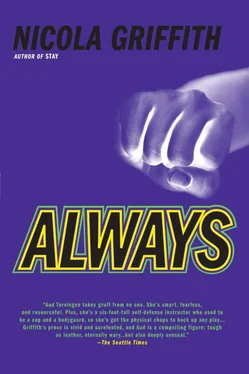IF YOU WALK INTO A BAR AND THERE’S A MAN WITH A KNIFE, WHAT DO YOU DO?Walk out again. If you can. In Atlanta it had been a kitchen, and a woman, and I couldn’t.
It’s a five-hour nonstop flight from Atlanta to Seattle. I had slept the first three hours, but I didn’t want to sleep anymore. If you don’t sleep, you don’t dream. I pressed my forehead against the vibrating cabin window and stared down at the Rockies, visible only as winks of snow in the setting sun.
Next to me, Dornan stirred and put his guidebook facedown on his lap. He peered over my shoulder at the scenery below. His T-shirt was still very white and his eyes very blue, but his hair, just long enough to hint at waviness, was flat at the back. “Looks like Mars,” he said.
I nodded. There were places there where no one had walked. Perhaps one day I would go exploring.
Dornan leaned back. “You missed dinner.” It was unclear from his tone whether he thought that was good or bad.
“I can eat when we get there.”
“I don’t know,” he said, and tapped the book on his lap. “I’ve been reading the tourist guide. The good restaurants mostly seem to shut at ten.” Right around when we’d be landing. “There’s always room service.”
You can’t learn much about a city from a hotel room, and I needed to hit the ground running. My mother would arrive in two days. “Let’s talk about it when we get there.”
Books were all well and good—I’d already read several histories, maps, and guides to Seattle since deciding on the trip—but I preferred somatic information to extra-somatic. I would know what I wanted to do when I smelled the air and tasted the water.
“So,” Dornan said. “You haven’t told me much about the new bloke.”
I didn’t say anything.
“Your new stepdad.”
I looked at him.
“Well, he is, technically. So what’s the story? You haven’t even told me his name.”
I opened my bag—once again I resented the nasty ripping sound of the Velcro flap, and missed the bag I’d given away—and pulled out the report.
“Eric Loedessoel,” Dornan said, reading over my shoulder. “Wait.” He pulled back. “You researched your stepdad?”
“It wasn’t difficult.”
“That’s not…” He shook his head.
I leafed through the list of sources: medical bills, brokerage accounts, limousine service, phone records, grocery bills, restaurant bills, and so on. Then the data itself. There was a photograph of Loedessoel taken last year in Washington, D.C., and a photo of his new wife, dated two months ago.
She was wearing a hacking jacket and turtleneck, a riding hat tucked under her left arm. I wondered what the photo opportunity had been, and why she looked happy. She hated horses. Her hair was dark honey streaked with grey, and cut in a soft, chin-length bob. It looked all wrong; my mother had had long hair for as long as I could remember. She had gained a few pounds. She looked younger and softer.
“Thumbnail sketch,” I said. “Male Caucasian, mid-fifties, five feet eleven, hundred and seventy-eight pounds, grey hair, grey-blue eyes. Born in Bergen to Norwegian parents; two sisters, one brother. Parents deceased. First year of medical school in Oslo, where he married a Danish woman, and the remaining years in Seattle, at the University of Washington. Graduated in the top third of his class. Never practiced, though.” No hint as to why. “Divorced the Danish wife a few months after graduation.”
“Children?”
“No.”
“Thank heaven for small mercies.”
My stomach squeezed. The possibility of step-siblings hadn’t occurred to me. “Job in Washington, D.C., with the Norwegian trade delegation. Climbed the ladder. Directorships in several pharmaceutical and biotech companies. Financially stable. Current residence in London.” Chelsea. I wondered if and when he would move into my mother’s official ambassador’s residence. I wondered if she still actually lived there.
I read some more. Dornan returned to staring out the window.
Loedessoel’s net worth was nearly four million dollars. Well matched with my mother’s assets. It would have seemed a lot to me four years ago. I started skimming. Clothes, hair, and manicure spending about what you’d expect for someone in his position. Cars: many purchases and resales. In the last three years, a Porsche Carrera, a Jaguar S-type, a Maserati, a vintage Bentley—that one had been sold after numerous high bills for replacement parts.
“He likes cars,” I said.
“Lots of men do.”
I skimmed the list of affiliations, memberships, and subscriptions: Mystery Guild Book of the Month Club, local wine society, the American Museum of Natural History, chamber of commerce, the local Gilbert and Sullivan Society. “He likes operetta.”
“That’s not exactly sinister.”
“Well, no.”
“But you’re frowning.”
“I’m trying to imagine my mother beaming fondly at a man dressed as the lord high executioner.”
“Giggling behind a fan.”
I stared at him.
The seat belt light went on. “Look at that,” he said, and busied himself with the tray table and footrest.
WE WALKEDpast the tired people in baggage claim and to the man holding a sign saying Torvingen.
“I’m Aud Torvingen,” I said.
He didn’t bat an eye at the Norwegian pronunciation but said, “Jeff,” and led us to the town car.
I fastened my seat belt and opened my window, and we pulled smoothly past the hordes waiting for taxis.
“Maybe you aren’t potty after all,” Dornan said, leaning back on the grey leather. He’d thought I had lost my mind when I’d first suggested FedEx-ing the luggage. Then I’d offered to pay, and suddenly it hadn’t been such a bad idea.
Traffic was light. The cool air, heavy at first with jet fumes, then the scents of late cherry blossom and second-growth conifer, reminded me of Oslo last year. It had been May then, too.
The engine hummed. I’d never driven a Lincoln, but I suspected it would handle like a squashy pillow. The interior wood trim, black bird’s-eye maple, was so heavily varnished it looked like plastic.
If I’d done my research correctly we were on Highway 99, which ran north and west into the city along the waterfront. I could sense the empty horizon stretching to my left, but I couldn’t see or smell it; there was a steady offshore breeze and the moon was hidden behind dense cloud. In Atlanta it would be twenty degrees warmer. In Oslo, twelve degrees closer to the Arctic Circle, the sky would still be light. There would not be so many cars on the road. My mother and new stepfather would be in the United States by now, in New York, or possibly Vancouver.
From a distance the Edgewater Hotel looked like a warehouse building, but as we approached, it became clear that what had seemed to be corrugated iron was in fact massive vertical timbers. Fir, I thought. Very Scandinavian. It was just after ten-thirty when we pulled into the parking lot. “Wait,” I told Jeff. “We’ll be out in ten minutes.”
The lobby was all exposed wood—definitely fir—and polished slate. I handed my Total Enterprises credit card to the woman behind the desk. She handed me two keys.
“They’re not next to each other. I’m sorry.”
“Not a problem,” I said, and gave one to Dornan. “Don’t unpack if it will take you longer than ten minutes.”
Читать дальше













